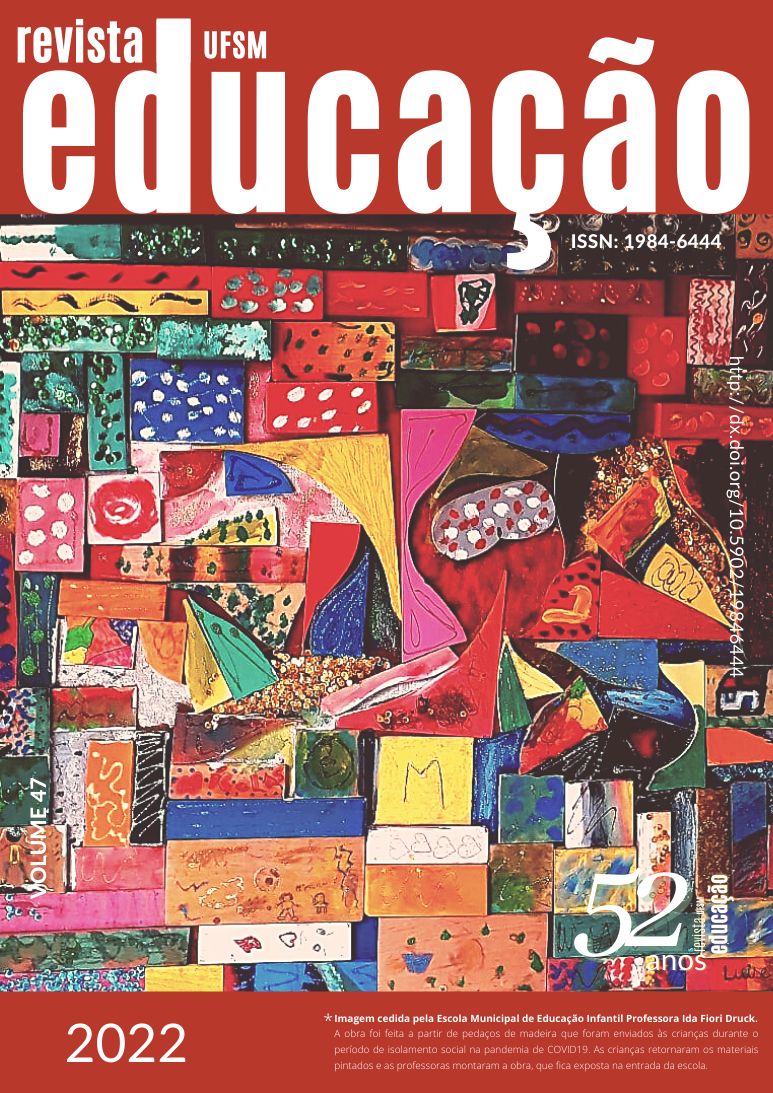Flipped classroom: Emancipation of masters and learned in the light of the ideas of Freire and Ranciére
DOI:
https://doi.org/10.5902/1984644445284Keywords:
Flipped Classroom, Paulo Freire, RanciéreAbstract
The authors Jacques Rancière and Paulo Freire in their works asserted the importance of education as a practice of freedom, without hierarchy, that leads students towards an intellectual emancipation. Our reflection is about the presence of these ideals in the adoption of the Inverted Classroom methodology to answer how the use of this strategy contemplates the precepts of these thinkers, in the perspective of emancipation, the equality of the intelligences of students and teachers. The general objective of the study is to reflect critically on how the Inverted Classroom contributes to the emancipation of students and teachers in the light of the ideas of Freire and Rancière, as well as to identify the pillars that support the methodology of inversion of learning and to extrapolate the conception tradition of being a teacher as a mere explainer. It is inferred that the object chosen for study may support the adoption of this new methodology, contributing to pedagogical practices that contribute to the construction of an emancipatory, egalitarian education, based on ethical values and solid foundations that allow the individual not only to be in the world, but be an integral part of it, problematizing, recognizing and intervening. The research has a qualitative approach and bibliographic procedure, composing a fabric of reflections and considerations to confirm or not the initial hypothesis. Its relevance centers on the possibility of identifying in the Inverted Classroom, in addition to a strategy for the use of technology in favor of learning, also a potential for the emancipatory exercise of teachers and students, in the practice of equality of intelligences. In this vein, the power of dialogue, the relevance of doubt and curiosity as bridges to knowledge will be highlighted, pointing out that Freire and Rancière's convictions are possible to materialize and are present in the development of this very contemporary strategy.
References
ALMEIDA, M. E. B. Integração de currículo e tecnologias: a emergência de web currículo. Anais do XV Endipe – Encontro Nacional de Didática e Prática de Ensino. Belo Horizonte: UFMG, 2012.
BARBOSA, Eduardo Fernandes; MOURA, Dácio Guimarães de. Metodologias ativas de aprendizagem na Educação Profissional e Tecnológica. B.Tec. Senac, Rio de Janeiro, v.39, n.2, p.48-67, 2013.
BRASIL. Ministério da Educação. Parâmetros Curriculares Nacionais. Brasília: MEC/SEF, p.1-23, 2000.
BERGMANN, J.; SAMS, A. Sala de aula invertida – uma metodologia ativa de aprendizagem. 1. ed. Rio de Janeiro. 2016.
COTTA, Rosângela Minardi Mitre; SILVA, Luciana Saraiva da; LOPES, Lílian Lelis; GOMES, Karine de Oliveira; COTTA, Fernanda Mitre; LUGARINHO, Regina; MITRE, Sandra Minardi. Construção de portfólios coletivo em currículos tradicionais: uma proposta inovadora de ensino-aprendizagem. Ciência & Saúde Coletiva. v.3, n.17, p.787-796, 2012.
DELORS, Jacques. Educação: um tesouro a descobrir. 2ed. São Paulo: Cortez, 2003.
FREIRE, Paulo. Pedagogia da Autonomia: Saberes necessários a prática educativa. São Paulo: Paz e Terra, 2002.
FREIRE, Paulo. Educação como prática da liberdade. Editora Paz e Terra, 2014.
FREIRE, Paulo. Conscientização. Cortez Editora, 2018.
GATTI, B. A. A construção da pesquisa em educação no Brasil. Brasília: Plano Editora, 2002. Cap. 1, p. 15-39.
GIL, Antônio Carlos. Como elaborar projetos de pesquisa. 4. ed. São Paulo: Atlas, 2002.
JORDÃO, Fabio. História: a evolução do celular, 2009.
LUCINI, M. Fenomenologia hermenêutica: uma experiência metodológica. In BRETAS, Silvana Aparecida; SOBRAL, M. N. (org.) Pesquisa em educação: Interfaces, experiências e orientações.
MISKULIN, R. G. S. Concepções teórico-metodológicas sobre a introdução e a utilização de computadores no processo de ensino/aprendizagem da geometria. 1999. 273 f. Tese (Doutorado em Educação Matemática) – Faculdade de Educação, Universidade de Campinas, Campinas, 1999.
OLIVEIRA, Y.D. A formulação do problema de pesquisa: considerações sobre uma experiência no âmbito da história da educação. In BRETAS, S. A. e SOBRAL; M. N. (org.) Pesquisa em educação: Interfaces, experiências e orientações. mimeo.
RANCIÈRE, Jacques. O mestre ignorante: cinco lições sobre a emancipação intelectual. Belo Horizonte: Autêntica, 2010.
VERGARA, Sylvia Constant. Projetos e relatórios de pesquisa em administração. 6. ed. São Paulo: Atlas, 2005.
Published
How to Cite
Issue
Section
License
Declaration of originality
We declare that all articles present in the journal Educação (UFSM) are originals and were not submitted for publishing on any other publication, as a whole or a fraction. We also declare that, after being published by Educação (UFSM), a paper will not be submitted to another journal within two years. After this time, our journal transfers the publishing rights to the authors, with a permit granted by the Editorial Council.
We also acknowledge that the originals’ submission to Educação (UFSM) implies on a transference of copyright for physical and digital publishing to the journal. In case of noncompliance, the violator will receive sanctions and penalties predicted by the Brazilian Copyright Protection Law (n. 9610, dated 19/02/98).
Attribution 4.0 International (CC BY 4.0)
This license lets others remix, transform, and build upon the material for any purpose, even commercially, and copy and redistribute the material in any medium or format.

This work is licensed under a Creative Commons Attribution 4.0 International (CC BY 4.0)






